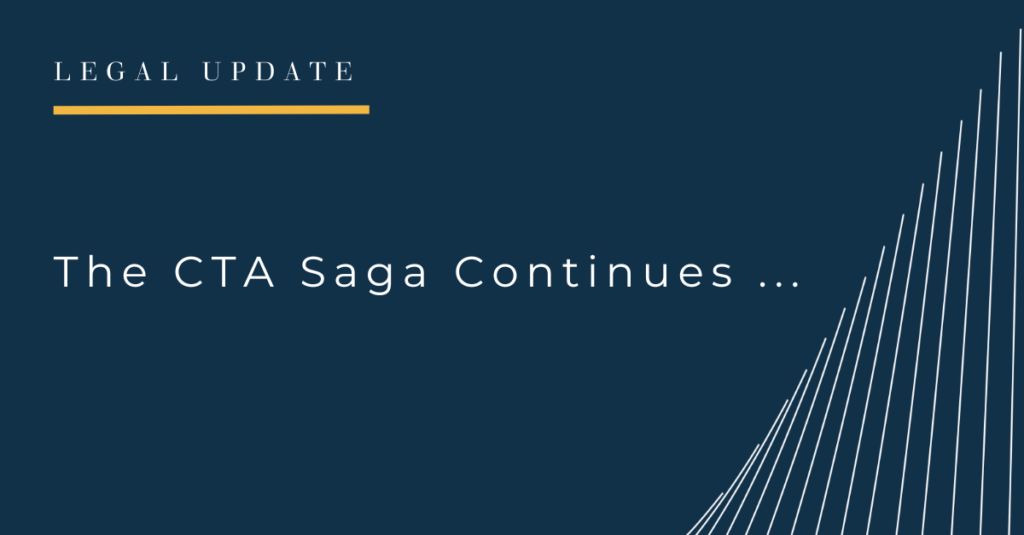Update as of January 24, 2025:
On January 24, FinCEN posted on their website that reporting companies currently continue to not be required to file beneficial ownership information with FinCEN and are not subject to liability for failure to do so. However, reporting companies may continue to voluntarily submit beneficial ownership reports.
FinCEN’s full statement follows:
On January 23, 2025, the Supreme Court granted the government’s motion to stay a nationwide injunction issued by a federal judge in Texas (Texas Top Cop Shop, Inc. v. McHenry—formerly, Texas Top Cop Shop v. Garland). As a separate nationwide order issued by a different federal judge in Texas (Smith v. U.S. Department of the Treasury) still remains in place, reporting companies are not currently required to file beneficial ownership information with FinCEN despite the Supreme Court’s action in Texas Top Cop Shop. Reporting companies also are not subject to liability if they fail to file this information while the Smith order remains in force. However, reporting companies may continue to voluntarily submit beneficial ownership information reports.
—-
Original Legal Update | January 23, 2025
In Brief
The US Supreme Court ruled on Thursday that FinCEN can implement and enforce the Corporate Transparency Act (“CTA”) while the case of Texas Top Cop Shop Inc. v. Garland waits to be heard before the US Court of Appeals for the Fifth Circuit. Oral arguments are currently scheduled for March 25.
In Detail
The stated purpose of the CTA is to create a national database of companies in the United States that identifies the human beings behind the companies, both owners and controlling persons. The law is part of an increasing effort to combat money-laundering, terrorism, tax evasion, and other financial crimes.
The Financial Crimes Enforcement Network (“FinCEN”), which is a bureau of the United States Treasury Department but is not part of the IRS, was tasked with creating and maintaining the database, which as of now will not be of public record but will be available to a variety of federal agencies and possibly others in the future. All “reporting companies” will be required to file reports with FinCEN that provide certain information regarding the companies and the “beneficial owners” of the companies.
This law affects virtually all closely held entities, including LLCs and other entities designed for estate planning purposes or liability protection, or merely as holding companies for assets such as real estate, aircrafts, or other investments. If an entity is created by filing paperwork with a Secretary of State (or tribal jurisdiction), it likely will have reporting requirements under the CTA. Even if an entity has only one owner and that entity is disregarded for federal income tax purposes (such as a single-member LLC), that entity will still have to file reports with FinCEN.
Exceptions to the reporting requirements include charities, large companies (20 or more employees and $5,000,000 or more in revenue) and other entities already subject to significant government regulation (such as banks).
Note that most trusts, except certain business trusts, are not considered “reporting companies” but may need to be reported as “beneficial owners” if they own or control interests in applicable closely held entities.
The CTA went into effect on January 1, 2024. However, on December 3, in Texas Top Cop Shop Inc., a judge in the US District Court for the Eastern District of Texas issued an injunction, blocking enforcement of the CTA nationwide. That order was lifted by the motions panel for the US Court of Appeals for the Fifth Circuit on December 23 but was then reinstated by a different Fifth Circuit panel on December 27.
The CTA requires newly formed entities to file an initial “beneficial owner report” within 30 days of creation. For entities that existed prior to January 1, 2024, the deadline for initial beneficial owner reports was January 1, 2025. After the temporary lifting of the injunction, FinCEN had changed that deadline to January 13. In light of the Supreme Court’s ruling, we anticipate they will issue a new deadline in the coming days.
The CTA provides for civil penalties in the amount of $500 per day per day for knowingly failing to file. Criminal penalties may also be imposed.




